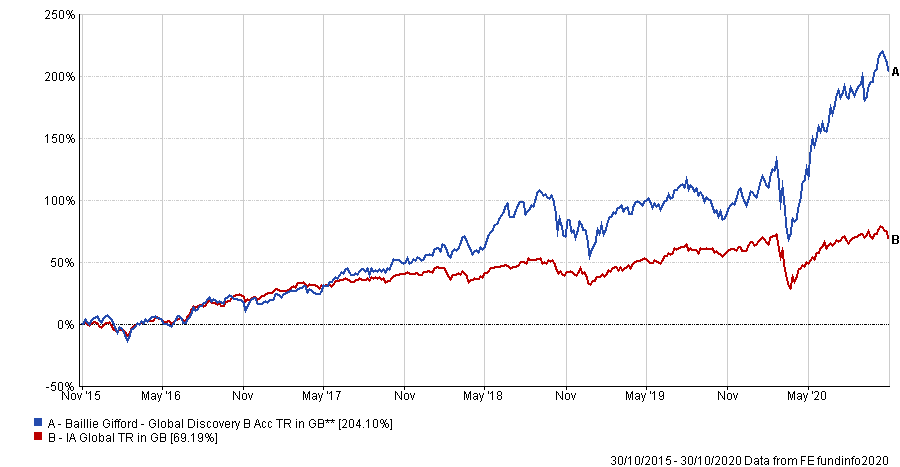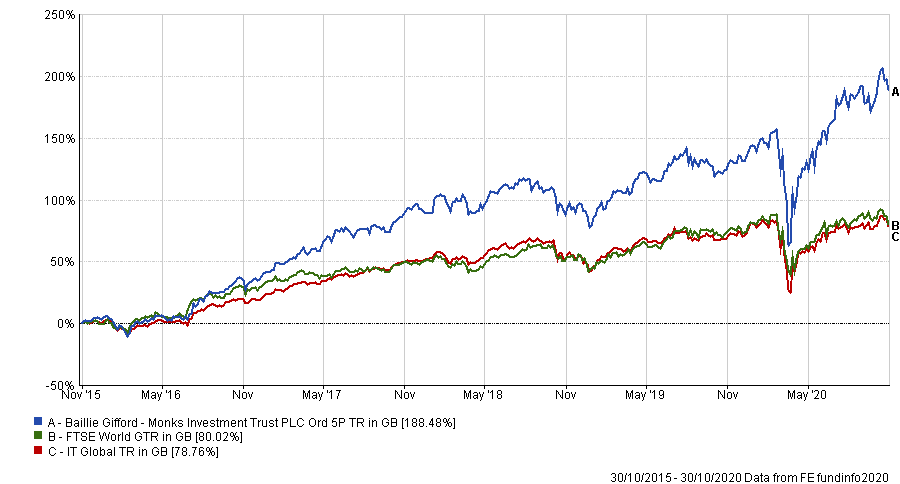Looking at the performance of global equity strategies year-to-date, the £15bn Scottish Mortgage Investment Trust and the £4.2bn Baillie Gifford Long Term Global Growth fund stand out as the top performers in the open- and closed-ended sectors.
Scottish Mortgage and Ballie Gifford Long Term Global Growth have delivered strong returns as the growth style has performed strongly in recent years.
Indeed, the more concentrated strategies and large bets on companies such as Tesla – in the case of Scottish Mortgage – have helped boost performance.
Yet, for investors who are fans of Baillie Gifford’s growth style of investing but want greater diversification on a portfolio level, there are two other global equity funds they may be overlooking, strategies that are less concentrated but still deliver strong returns.
Fergus Shaw, co-manager of the £110m TM Cerno Select fund, prefers to back the £1.5bn Baillie Gifford Global Discovery fund, run by FE fundinfo Alpha Manager Douglas Brodie, with Luke Ward and Svetlana Viteva.
“To me, it is just a perfect way of getting to the core of Baillie Gifford, the firm,” he said.
“They created this team called ‘Global Discovery’ under Douglas Brodie, to be the idea generator for the whole firm. The remit was to find really interesting, immature businesses, that could potentially be the 20-, 30-, 40-year holdings for Baillie Gifford. That was, to me, just brilliant.”
He contrasted the Baillie Gifford fund’s approach with that of his firm’s £85m TM Cerno Global Leaders fund, which he said looks for “brilliant businesses, which are already established”.
Shaw said Baillie Gifford Global Discovery represents “the other side of equity investment” in that “[it] looks at businesses which might be binary in their outcome, it either works or it doesn’t, something will go bust, and it’s not concentrated because of those things”.
He said: “Basically, I see it as the ‘secret sauce’ of Baillie Gifford.”
Trustnet readers are aware of it, however, and have been researching it more in the third quarter of this year. The £1.5bn Baillie Gifford Global Discovery fund was the third most popular fund researched during Q3, just behind Fundsmith Equity and Baillie Gifford American.
It has been helped by performance this year having made a total return of 49.72 per cent to end-October, compared with a 3.15 per cent gain for the average IA Global peer.
Performance of fund vs sector over 5yrs

Source: FE Analytics
But it has also made strong gains over the long term, with the Baillie Gifford Global Discovery returning 204.10 per cent over the last five years, compared with a 69.19 per cent gain from the average peer. It has an ongoing charges figure (OCF) of 0.78 per cent.
In the investment trust world, Peter Walls, manager of the £96m Unicorn Mastertrust, revealed why he also preferred a less concentrated Bailie Gifford global equity strategy than its popular £15bn Scottish Mortgage Investment Trust.
Scottish Mortgage has made a total return this year of 72.19 per cent compared with 1.09 per cent gain for the FTSE All World benchmark.
Highlighting the £2.6bn Monks Investment Trust instead, Walls described it as ‘Scottish Mortgage-lite’, “in that it will hold some of the same companies, but not to the same degree”.
“I can’t take away from the fact that Scottish Mortgage has had a fantastic run and shot the lights out in terms of performance, but Monks has also done well against its peer group,” he said.
Monks is the second highest performing trust in the 16-strong IT Global sector year-to-date, albeit with a 19.77 per cent return that is far behind its larger sister strategy.
One thing that deterred Walls from investing in Scottish Mortgage was the concentration of its holdings in the portfolio. Indeed, its largest holding is a 12 per cent stake in Tesla and its top-10 holdings make up 51.3 per cent of its portfolio.
The largest holding in Monks Investment Trust, on the other hand, is a 2.7 per cent stake in Amazon and its top-10 holdings make up just 21.6 per cent of its portfolio.
Walls said: “I buy into the whole idea of disruptive businesses, and do hold them through Monks, but probably in a slightly diluted format.
“My whole style really is buying things at a discount to NAV [net asset value], and for most of recent years, Scottish Mortgage has never been a significant discount to NAV.”
He recalled when the board of Monks brought in Baillie Gifford as manager of the trust – under the Global Alpha team’s Charles Plowden, Malcolm MacColl and Spencer Adair – five years ago and shares were trading at a big discount.
“What I like about the Monks style is that it is more diversified as a portfolio and they will top slice and recycle capital into areas that attract them, out of areas that have done particularly well,” said Walls.
Although shareholders in Scottish Mortgage voted to increase the limit on unquoted holdings in its portfolio from 25 per cent to 30 per cent in July, Walls said it would be wrong to confuse Scottish Mortgage and their investments in unlisted space as venture capital or private equity.
He said: “They are investing in businesses that are already very well-established in most cases and are getting exposure to those businesses through their networking in the listed market. “I think they’re using their position of strength in many of these newer technology businesses, to enhance the returns and get exposure to these businesses.
“But these things don’t always go in a straight line. There will be some upsets along the way, some companies are not going to live up to the expectations that valuations place upon them today,” he finished.
Performance of trust vs sector & benchmark over 5yrs

Source: FE Analytics
Monks Investment Trust has been a strong long-term performer delivering a 188.48 per cent total return over the last five years, compared with a 78.76 per cent gain for the average peer in the IT Global sector, and 80.02 per cent from the FTSE World benchmark.
It has ongoing charges of 0.48 per cent, is 5 per cent geared, the trust is currently trading at a 2.9 per cent premium to net asset value (NAV), as at 3 November.





